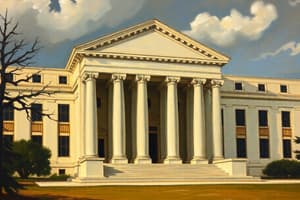Podcast
Questions and Answers
What is an Easy Money Policy?
What is an Easy Money Policy?
- Monetary policy that does not affect the money supply
- Monetary policy that increases the money supply (correct)
- Monetary policy affecting only government spending
- Monetary policy that decreases the money supply
What does a Tight Money Policy do?
What does a Tight Money Policy do?
- Increases the money supply
- Decreases the money supply (correct)
- Keeps the money supply stable
- Encourages inflation
What is the FOMC?
What is the FOMC?
Federal Open Market Committee
What are Government Bonds/Securities?
What are Government Bonds/Securities?
What is the function of the Federal Reserve?
What is the function of the Federal Reserve?
What is the Discount Rate?
What is the Discount Rate?
What are Federal Reserve Districts?
What are Federal Reserve Districts?
Who is the Fed Reserve Chairman?
Who is the Fed Reserve Chairman?
Define Monetary Policy.
Define Monetary Policy.
What is Fiscal Policy?
What is Fiscal Policy?
What is Inflation?
What is Inflation?
What does GDP stand for?
What does GDP stand for?
What is Unemployment?
What is Unemployment?
What are Open Market Operations?
What are Open Market Operations?
What are Government Securities?
What are Government Securities?
Define Aggregate Demand.
Define Aggregate Demand.
The Fed can increase the money supply by lowering the ______.
The Fed can increase the money supply by lowering the ______.
To decrease the money supply, the Fed can raise the ______.
To decrease the money supply, the Fed can raise the ______.
Flashcards are hidden until you start studying
Study Notes
Easy Money Policy
- Aims to increase the money supply to stimulate the economy
- Actions include lowering the discount rate, reducing reserve requirements, and purchasing government securities
Tight Money Policy
- Focuses on decreasing the money supply to reduce inflationary pressures
- Strategies involve increasing discount rates to slow down aggregate demand
FOMC
- Federal Open Market Committee makes key decisions affecting the economy by adjusting the money supply
- Considered the most influential committee within the Federal Reserve
Government Bonds/Securities
- U.S. Treasury bonds issued by the government with various terms including 3 months, 6 months, and 1 year
Federal Reserve
- Established in 1913 under the Federal Reserve Act, serving as the central bank of the U.S.
- Operates as an independent agency in the federal executive branch, regulating banking and national monetary policy
- Oversees financial stability and is owned by commercial banks
Discount Rate
- The interest rate charged for loans from the Federal Reserve to financial institutions
Federal Reserve Districts
- The Federal Reserve Act created twelve banking districts; Georgia operates under the Atlanta district
Fed Reserve Chairman
- Leads the Federal Reserve Bank Board of Directors and serves on the FOMC
- Appointed by the U.S. Senate
Monetary Policy
- A government tool to influence macroeconomic conditions such as inflation, unemployment, and economic growth
- Implemented through changes in interest rates or exchange rates
Fiscal Policy
- Government economic strategies focused on modifying spending and taxation levels to influence economic conditions
Inflation
- Characterized by a general rise in prices, with a target inflation rate set by the Fed at no more than 2%
GDP (Gross Domestic Product)
- Measures the total market value of all final goods and services produced annually, with a Fed target growth rate of 3-5% for job creation
- Concept originated from economist John Maynard Keynes
Unemployment
- Represents individuals actively seeking work but unable to find employment
- The Fed targets an unemployment rate of 5% or less
Open Market Operations
- Involves buying and selling government securities to adjust the money supply directly
Government Securities
- Include Treasury notes, bills, and bonds representing government borrowings, typically offering low interest due to government backing
Aggregate Demand
- The total demand for goods and services in an economy from various sectors including consumers, firms, government, and foreigners, equivalent to GDP
Ways to Increase Money Supply
- Strategies include lowering the discount rate, reducing reserve requirements, and buying government securities
Ways to Decrease Money Supply
- Measures involve raising the discount rate, increasing reserve requirements, and selling government securities
Studying That Suits You
Use AI to generate personalized quizzes and flashcards to suit your learning preferences.




